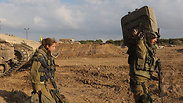
Conclude operation and come home
Analysis: IDF forces must leave Gaza now because they have no missions justifying their presence there.
A crowded lineup of State of Israel flags was placed behind Prime Minister Benjamin Netanyahu and Defense Minister Moshe Ya'alon. The flags conveyed a sense of festivity. The two officials' faces conveyed a sense of Tisha B'Av.
Netanyahu delayed his appearance by 20 minutes because of the comments made by the family members of kidnapped officer Hadar Goldin. The family demanded defiantly that the IDF avoid leaving the Strip as long as their son was in Hamas' hands, dead or alive.
Netanyahu and Ya'alon did not accept the demand, but were forced to rewrite their speeches. From an announcement about a unilateral withdrawal of IDF forces from the Strip, Netanyahu moved to vague, unbinding sentences, such as "all options are on the table." When the Americans say that about Iran, we know there are neither options nor a table, that it's all talk. I doubt Netanyahu has any options.
While Netanyahu spoke, someone hung signs against abandoning captives along the Defense Ministry walls. Everything is immediate now, even the protest. The two will have to deal with harsh criticism from the right, which will use Second Lieutenant Goldin as a flag.
For Netanyahu this is quite a difficult test, versus both his audience and the storm of emotions in all parts of the Israeli society. No one wants to go back to the prices paid for Gilad Shalit's return or for the bodies of Eldad Regev and Ehud Goldwasser.
The cabinet convened on Friday after the Rafah incident. There was a lot of anger, great frustration, but in the end the majority decided to contain the incident. The IDF would prepare for a unilateral pullout. There would be no agreement with Hamas: The calm would be based on deterrence.
This is exactly what I suggested that the cabinet should do 11 days ago, in my column published July 24. When I heard Netanyahu on Saturday night using the exact same words to describe the advantages of deterrence without an agreement, I thought about the 33 fighters, good Israelis, who could have still been alive today if Netanyahu hadn't been so afraid of making a decision; I thought about the hundreds of Gazan residents killed in vain; and I thought about the damage inflicted on Israel in the international arena, which will continue to escort us even after the operation.
I was angry and I was glad. It's better late than never.
The column was titled "Relay on deterrence, not on understandings with Hamas." It said, among other things, that "within two or three days, when the IDF completes its work on the tunnels leading to Israeli territory, Prime Minister Benjamin Netanyahu and Defense Minister Moshe Ya'alon will announce that Operation Protective Edge has ended, and that a new operation is underway.
"From now on, Israel is taking initiative into its own hands: It is removing the ground forces, but if Hamas continues to launch rockets, it will pursue and even intensify the Air Force bombings, or the artillery fire.
"The immediate advantage of this idea is that Israel is no longer being dragged by Hamas. Someone has gotten somewhat confused here: Hamas is the one in need of understandings with Israel; not the other way around."
I reviewed the history of military operations against terror organizations. When understandings were reached, they were violated. Deterrence lasted.
With terror organization, I wrote, "understandings are like wind-driven chaff. The power of IDF operations is in the deterrence they create, not in the understandings reached at their conclusion. When it comes to Hamas, Israel should probably rely on deterrence rather than on an agreement."
The reactions I received about the column, from moderate ministers and right-wing ministers, were surprising. I was particularly satisfied with responses I received from the IDF echelon. I seemed to have concurred with knowledgeable people.
The IDF forces must leave because they have no missions justifying their presence there. If it were possible for the Sayeret Matkal special forces unit to burst forth into the underground tunnels in the heart of Gaza and pull the Hamas leaders out of there, it would have been worthwhile staying there, but this option is apparently not on the agenda. Occupying Gaza is not on the agenda either.
Sometimes the bravest decision is to conclude, and come home.










